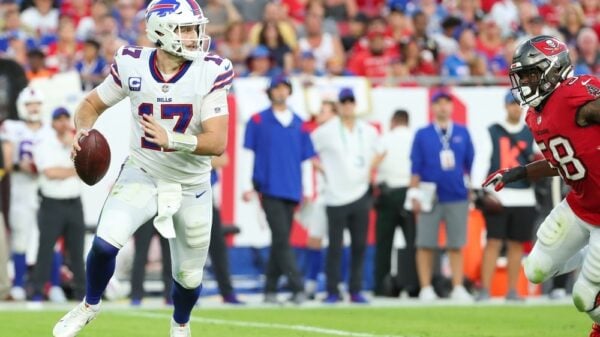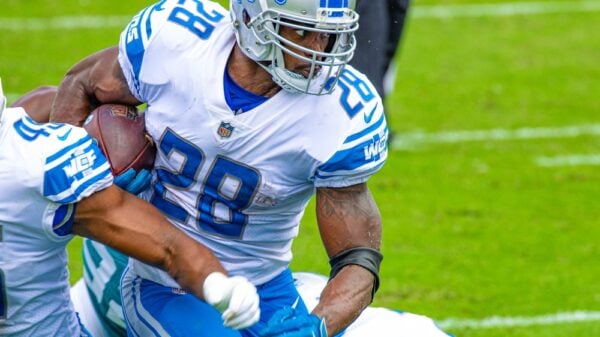Josh Allen’s recent victory in the NFL MVP award has taken many by surprise, particularly since it came at the expense of Lamar Jackson, who many felt had secured the trophy with his exceptional performances late in the season. For avid football fans, the competitive rivalry between these two quarterbacks underscores the unpredictable nature of MVP voting. While Allen ultimately claimed the award this year, Jackson, following his electrifying displays and designation as a First-Team All-Pro, appeared set for a second consecutive MVP title.
In football, achieving All-Pro status is a significant accolade—recognized as the elite within the league by a panel of seasoned voters. However, the fascinating aspect of this situation is that the same group could commend Jackson yet choose not to award him the MVP title. Rich Eisen, a respected sports commentator with more than two decades in the NFL, highlighted this contradiction. With his extensive experience observing MVP voting trends, he noted that selectors often operate in unexpected ways. Eisen expressed that it was entirely plausible for the voters to recognize Jackson’s excellence without granting him the top honor. “It’s thoroughly unpredictable for them to give Lamar First-Team All-Pro and not vote him MVP. Didn’t surprise me one bit,” he stated, shedding light on the sometimes intricate psychology surrounding MVP selection.
What set Allen apart in this race was his knack for elevating the Buffalo Bills to new levels. Under his stewardship, the team displayed an intensity on the field, making them formidable rivals. Key victories against teams like the Lions and the Chiefs illustrated Allen’s ability to lead his squad to triumph under pressure. Nevertheless, despite impressive statistics—4,262 passing yards, 40 touchdowns, and a passer rating of 101.4—skeptics noted that a relatively softer schedule in the crucial closing weeks of the season might have influenced Allen’s MVP candidacy. “But Josh didn’t have to play big games toward the end because he had already done enough earlier in the season,” critics pointed out.
Eisen himself has indicated that if given the chance to vote, he would lean toward Allen, praising his skill to achieve more with less—often overlooked in the broader MVP narrative. Eisen has built his career on in-depth analysis and a profound grasp of the game; however, he expressed feeling somewhat sidelined in the voting process due to the long-standing perceptions within the Associated Press that individuals in his position—connected to the NFL and Roger Goodell—may struggle to remain impartial. Reflecting on this, Eisen believes that those actively engaged in analyzing games should indeed hold voting power.
So, how does MVP voting function in the NFL? The process is nuanced, involving a group of 50 selected media members—journalists and former players alike—casting their votes. Each voter ranks their top five players using a point system, with a first-place vote receiving 10 points, second place earning 5, and so forth. Considering the influence these voters wield, their choices can significantly affect the outcome.
When comparing statistics, it’s clear why some voters leaned toward Jackson. With 5,087 passing yards, 45 touchdowns, and a passer rating of 119.5, his numbers were among the best. Historically, MVPs tend to secure their titles through outstanding statistical performances, and Jackson’s figures certainly contributed to the discussion. However, it’s crucial to recognize that MVP voting extends beyond mere numbers, factoring in context and narrative. Allen led the Bills to the second seed in the playoffs, demonstrating his capacity to win critical games when stakes were high—a reality that strengthened his MVP candidacy.
Further complicating matters, one must consider the Ravens’ roster, which included nine Pro Bowl players and a star running back like Derrick Henry. Jackson’s prior MVP victories had less statistical support but were propelled by a compelling narrative about his exceptional impact on the field. This year, however, the shifting expectations raise questions about how the criteria seemed to shift in Allen’s favor. Ultimately, it’s a common sentiment that MVP considerations often hinge on memorable moments, and Allen’s captivating performances certainly passed this “eye test” this season.
As fans and commentators reflect on the aftermath of the MVP voting, we cannot overlook the emotional journey both quarterbacks experienced throughout the season. It serves as a reminder that while statistics and accolades play a crucial role in the dialogue, the drama and heart of the game often resonate in the memories we carry into the next season.
Image Source: The Rich Eisen Show @ YouTube






















